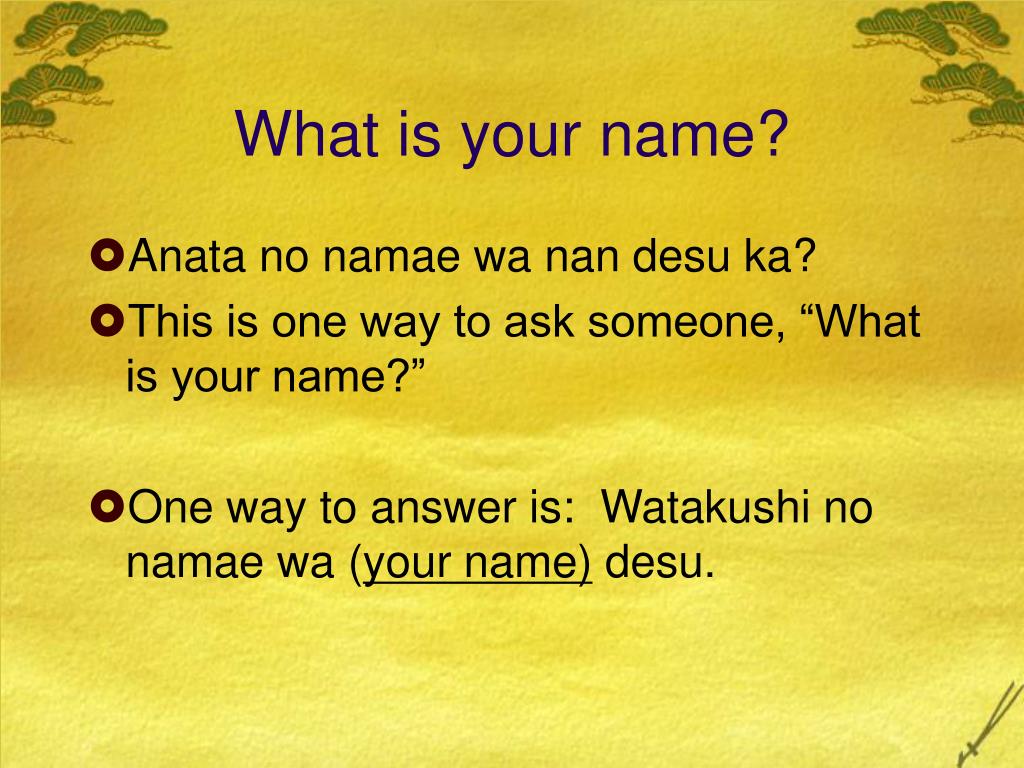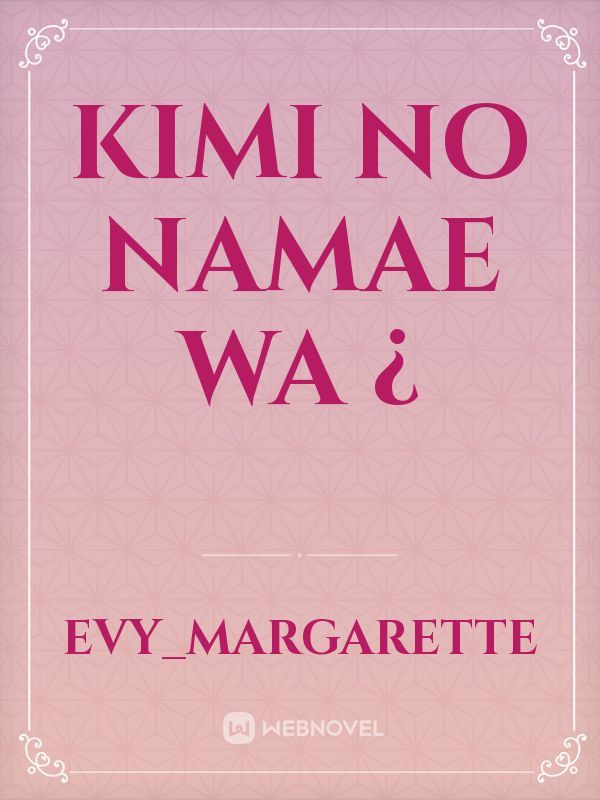What is the difference between "Onamae wa?" and "Onamae ka?" ? "Onamae wa?" vs "Onamae ka

Ano Hi Mita Hana no Namae wo Bokutachi wa Mada Shiranai HD Wallpapers / Desktop and Mobile
Apakah kamu pernah bertanya kepada seseorang, "Anata no namae wa nan desu ka?" yang artinya "Apa nama kamu?" Ya, ini adalah pertanyaan yang sangat umum di seluruh dunia ketika bertemu dengan seseorang. Dalam budaya Jepang, nama adalah salah satu hal yang sangat penting dan terhormat, dan oleh karena itu penting untuk memperkenalkan diri.

Anato No Namae Wa Anata No Namae Wa Nandesuka Stoner Stanley Meme Generator Ano hi mita hana
In English, "I am ", "he or she is " and "we, you or they are ", and also "I speak " and "he or she speaks ". There is no such changes in Japanese. But they do change the form for other purposes such as tense (past, present, present progressive, etc.). You will learn more in the following lessons. Lesson 3: Introducing Yourself - Useful.

Kimi no namae wa ¿ Magical Realism Webnovel
Your Name (Japanese: 君の名は。, Hepburn: Kimi no Na wa), sometimes stylized as Your Name., is a 2016 Japanese animated romantic fantasy film written and directed by Makoto Shinkai, produced by CoMix Wave Films and distributed by Toho.It depicts the story of high school students Taki Tachibana and Mitsuha Miyamizu, who suddenly begin to swap bodies despite having never met, unleashing.

Arti Man Jadda Wa Jadda dan Penjelasannya Freedomsiana
However, in the world of anime and manga, "kimi no namae wa" has become a popular way to introduce characters and build relationships between them. The Use of "Kimi no Namae wa" in Relaxed Indonesian Language. While "kimi no namae wa" is a Japanese phrase, it has also become popular in Indonesian pop culture.
How do you say ""what's your name" is it " anata no namae wa nan desu ka" or "O namae wa
Mari kita lihat arti masing-masing kata tersebut. Watashi : Saya. no : partikel dengan fungsi kepemilikan. Namae : nama. wa : partikel dengan fungsi penunjuk topik ( watashi no namae) ___ : di isi dengan nama kalian. desu : akhiran kalimat yang menunjukkan kesopanan. Nah, mudah bukan cara memperkenalkan nama kalian dalam bahasa Jepang.

Menakjubkan 24+ Wallpaper Wa Full Hd Richa Wallpaper
Namun, apa sebenarnya arti dari Kimi no Namae wa? Arti Kimi no Namae wa. Kimi no Namae wa adalah kalimat yang umum digunakan dalam budaya populer Jepang. Kalimat ini sering muncul dalam film, anime, dan manga. Secara harfiah, Kimi no Namae wa berarti "nama kamu adalah" atau "apa nama kamu" dalam bahasa Indonesia.
What is the difference between "Onamae wa?" and "Onamae ka?" ? "Onamae wa?" vs "Onamae ka
When meeting someone for the first time, the standard introduction has two parts. First, each person says: はじめまして。. Hajimemashite. exp. "It's our first time meeting." Pronunciation note: the 'shi' in "hajimemashite" has an unvoiced vowel, so it sounds like ha-ji-me-ma-*sh*-te. You can read about vowel devoicing here.

Taqabbalallahu Minna Wa Minkum in Arabic Meaning, Reply & Wallpaper
For example, if one's name is Anna Miyazaki, the phrase would be "Watashi no namae wa Miyazaki Anna desu.". This is a formal approach of introducing one's self. However, most Japanese do not use the word "watashi.". In fact, if one would like to sound more like the local, one can just say, "Anna desu.". This translates to just.

My name is... in Japanese Watashi no namae wa desu YouTube
'Watashi no namae wa __ desu' (わたしの名前は __ です) : Nama saya adalah _(sebutkan nama)_.. 'Douzo yoroshiku' (どうぞよろしく), yang artinya "Mohon bantuan/bimbingannya". Anda juga mengucapkan dengan cara yang terdengar lebih sopan, yaitu 'Douzo yoroshiku onegaishimasu' (どうぞよろしくおねがいし.

Anata No Namae Wa (bumping into a neighbor on the street) a
Japanese: (私は)___出身です。. Reading: (Watashi wa) ___ shusshin desu. English: " (I) am from (my origin is) ___.". This is a typical way to answer the question. The word 出身 ( shusshin) refers to a person's origin, such as his or her hometown, city, or country. If you're a foreigner in Japan, you can put your country name in.
Ucapan Taqabbalallahu Minna Wa Minkum Arab
Casual. Stating your name and adding "desu" is enough to introduce yourself. When you meet someone for the first time, they will probably ask you what your name is. " Onamae wa?" (お名前は?. In this case, you can just answer this question by saying "____ (your name)___ desu (です)" Namae (名前)means name, and we.

“Anata no namae wa nan to iimasu ka?” significa “¿Cómo te llamas?” y está en idioma japonés
Kata Jepang "名前" terdiri dari dua karakter kanji: "名" yang berarti "nama" dan "前" yang berarti "sebelum" atau "sebelumnya". Bersama -sama mereka membentuk arti "nama" atau "nama panggilan". Pengucapan dalam bahasa Jepang adalah "nama". Kata ini sering digunakan dalam situasi formal dan informal untuk merujuk pada nama seseorang.

Taqabbalallahu Minna Wa Minkum Tulisan Arab dan Artinya Freedomsiana
Say Totsuzen desu ga, jiko shōkai sasete kudasai (Pardon me, may I introduce myself.) to get things started. Start with a greeting. The simplest greeting is Konnichiwa, which means Hello or Good Afternoon. Introduce yourself. The two most common ways to introduce yourself are Watashi no namae wa __________ desu.

Kimi No Namae Wa... YouTube
Di dalam karakter tersebut terkandung makna filosofis yang dalam. Karakter tersebut memiliki arti khusus, dan orang tua memilih nama anak mereka berdasarkan arti tersebut. Sebagai contoh, nama "Akira" (明) artinya "terang" dalam bahasa Inggris dan berasal dari kanji dengan arti yang sama. Nama ini bermakna baik dan positif. 4.

Sami’na Wa Atho’na Tulisan Arab dan Artinya Freedomsiana
Watashi no namae wa desu. 私の名前は です. My name is The first on this list, and the most widely taught way to introduce your name in Japanese is watashi no namae wa desu. It may seem like a mouthful, so let's break down the sentence in order to make it more digestible! The pronoun watashi (私 / わたし) means 'I'.

名前は片想い (Namae wa Kataomoi) (English Translation) indigo la End Genius Lyrics
namae - 名前 (なまえ) : a noun meaning 'name'. wa - は : a binding particle working as a case marker or topic marker. In the phrase, this works after "onamae" to make the subject. nan - 何 (なん) : an interrogative pronoun meaning 'what' in Japanese. desu - です : an auxiliary verb used after a noun or adjective.